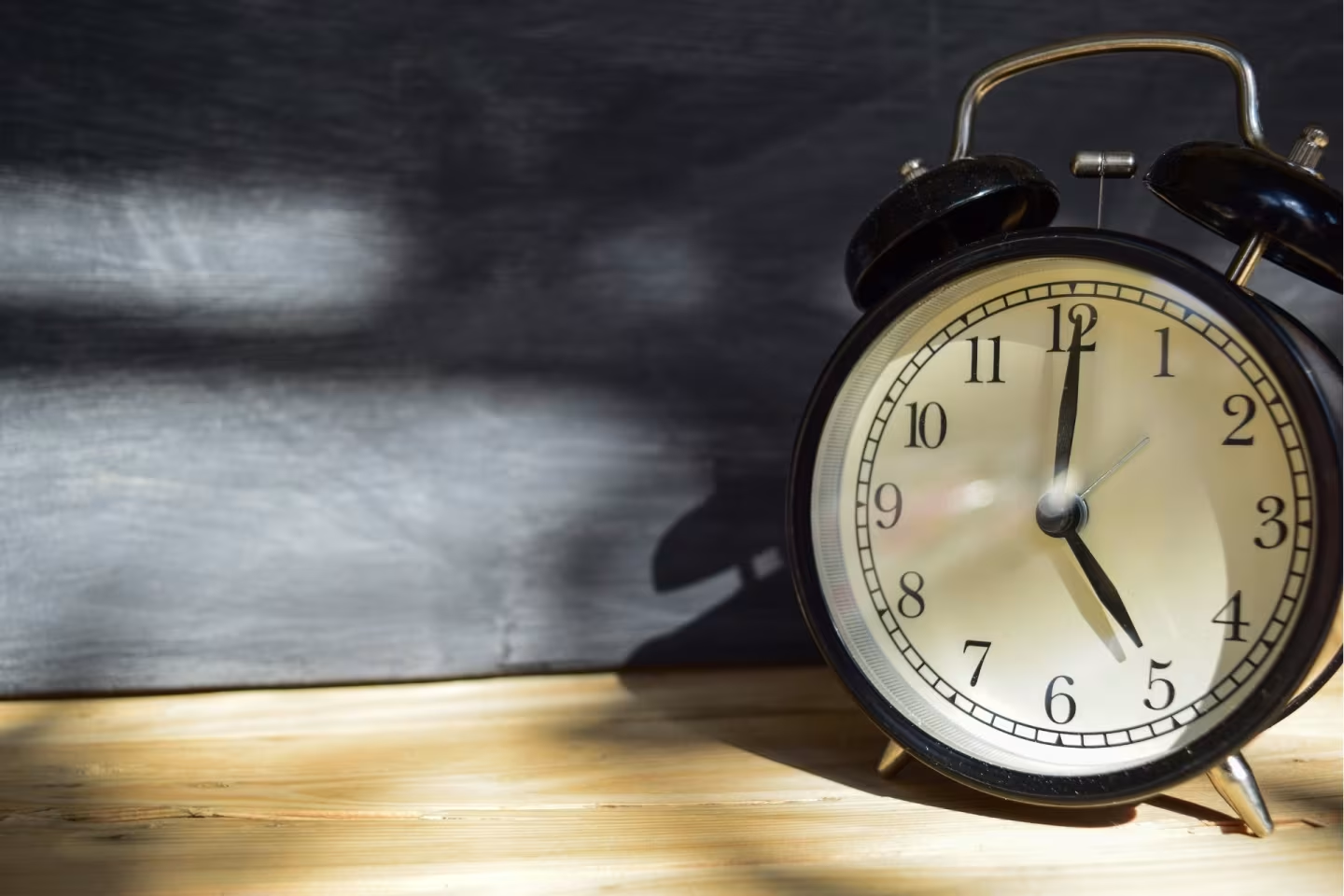Ask an expert with Amber LoRe
Updated Oct 16, 2025

Huckleberry pediatric sleep consultant Amber LoRe recently joined us on IG for an Ask an expert: Sleep edition. ICYMI, here's what our users are wondering about when it comes to all things baby sleep — and how grown-ups can get a little more shut-eye, too!
All about newborn sleep
If there's anything newborns have in common when it comes to sleep, it's that they're all different! We know that may not help much, but it also means there's a wide range of "normal." Pat yourself on the back. You're doing a great job.

My baby is 2 months old. Is it too early to set a sleep schedule?
During the newborn period, we don't recommend following a set schedule like the . If you're looking for more predictability, you can:
aim for a consistent wake up time each morning (i.e., avoid letting your baby sleep late on some days)
offer nap/bedtime according to wake times (45 minutes - 1.75 hours in between naps at this age) and sleepy cues
introduce pre-sleep routines before naps and bedtime (they don't need to be complicated; short and consistent is best at this age)
Check out our for more information.
How can I get my 10 week old to nap for more than 30 - 45 minutes?
Following age-appropriate wake windows (45 minutes to 1.75 hours for 2 month olds) can help ensure your baby isn't waking due to overtiredness.
How do I get my child to know day from night? My 3 week old currently has them flipped.
Try limiting individual naps to 2 hours and using artificial light to your advantage. Turn on bright lights during the day and keep the room dark after bedtime.
How do I get my newborn to sleep in their bassinet? She only sleeps when held. I've tried everything!
This is a common challenge for parents! Try letting your baby spend a few minutes of awake/play time in the bassinet each day to help them get accustomed to the space. Some babies have a tough time adjusting to sleeping flat on their back. Practice makes progress, so keep offering sleep in the bassinet on a regular basis. If you suspect they're in discomfort, be sure to check with your pediatrician to rule out reflux or other medical conditions.
What's a "normal" bedtime for a 3 month old?
This depends on your baby's wake time and cultural norms. At this age, we do start to see bedtimes shift earlier than during the newborn period. A baby waking around 7:00 AM would probably need to go to bed between 8:00 and 9:00 PM. The most important thing is that your baby is well-rested, which usually means at least 10 - 11 hours of sleep at night.
Night wakings
It's no surprise that night wakings are a top concern for parents of babies and young children. Here at Huckleberry, we don't just want to commiserate — we want to help!
My 3 month old wakes up every 1.5 hours to nurse for 5 minutes — then falls back asleep. Help!
It sounds like your baby might be waking due to a sleep association with feeding to sleep, rather than due to hunger. (Thank the)
At this age, you can start giving your baby more opportunities to fall asleep at bedtime with less help Consider trying to help your baby fall back to sleep during the night by patting/rocking rather than nursing right away. This can help lengthen the time between feeds so that your baby is taking in a bigger feed each time, rather than "snacking" frequently throughout the night.
Should 4 month olds be sleeping through the night? Is one wake up age-appropriate?
Some babies this age can sleep through the night, but many cannot. The circadian rhythm isn't fully formed at this age, and many babies continue to wake at least once a night, even if you do everything "right."
Dream feed or no dream feed to help a 4.5 month old sleep through the night?
If your baby is waking from hunger during the night, a may be able to help extend their sleep. You can always try it for a week and see if it helps consolidate night sleep. If a baby is waking for other reasons (e.g., due to overtiredness, or because they have a sleep onset association), a dream feed won't usually help a family get more sleep.
How can I stop night wakings with my 14 month old? She self settles but needs a feed (she's breastfed).
If your baby already falls asleep on their own at bedtime, I recommend night weaning fully to reduce the night waking. I remember when my daughter was 13 months old — she had great independent sleeping skills, but continued to wake once a night until I fully night weaned. She then started sleeping through the night without any wakings.
My 9 month old wakes 6 times a night, and only breastfeeding puts her back to sleep. Help!
This sleep pattern is common in babies who have a sleep onset association with feeding at bedtime. My oldest child had the same pattern when he was a baby, so I know how brutal that sleep deprivation can be!
If you've already determined that she has an age-appropriate schedule, the next thing we'll want to work on is helping her learn to fall asleep independently at bedtime (if she isn't already doing so).
Even when I nail naps during the day, my 2 year old wakes at 2:00 AM - 4:00 AM every morning without fail. What's going on?
Toddlers and preschoolers can wake for a variety of reasons. We don't expect them to never wake and want your help at night, but waking nightly can be exhausting! If your child's already napping well and their schedule looks good, you'll want to encourage them to fall back to sleep each night in their own sleep space, with less help from you.
A toddler clock can be a great tool to use when your child is waking during the night out of habit. The visual cue combined with positive reinforcement (in the form of specific praise — "You stayed in bed the whole night until the light turned green. Great job!") can help reduce night wakings. I used toddler clocks with both of my children and they were very helpful.
Nap time is the best time
As adults, we'd do almost anything to squeeze in a nap. So why do children often resist this luxury? We may never know — but we can answer some of your common nap questions.
Is it OK that my 13 month old on a one nap schedule has varying nap length? Sometimes it's 50 minutes; other times it's 2.75 hours! He's a daycare baby.
This is very common for children in the midst of a . I'm happy to report it's temporary! On the days that your baby takes a short nap at daycare, you can aim for an earlier bedtime to help limit overtiredness if possible (even 15 - 30 minutes can help). On the weekends, you can also try offering two naps if the first nap is short.
Should I wake my 7 month old if a nap is too long or out of schedule?
While we hate to wake a sleeping baby, we make exceptions in some cases. Extra long naps (individual naps that are over 2 hours, or total day sleep that is over 3 - 3.5 hours at this age) can sometimes interfere with night sleep. If you find that letting your baby take long naps during the day is resulting in less than 10 hours of sleep at night (or long periods of night waking), we recommend limiting day sleep.
Is it OK to put my baby to bed around 6:00 PM while in process of dropping nap #4? 16 weeks.
Some 4 month olds are capable of taking 3 good naps and sleeping 12 hours a night. However, we wouldn't expect a baby to sleep for more than 12 hours at night on a regular basis. If your baby can sleep for 12 hours, and a 6:00 AM waking works well for your family, then a 6:00 PM bedtime is fine.
How much time before bedtime should the last nap of the day end?
This is a great question — and the answer depends on your child's age and sleep patterns. The SweetSpot feature in the Huckleberry app helps take the guess work out of sleep times by predicting in real time when your baby will next be ready for sleep.
My 12 month old is suddenly fighting all sleep and just sits and cries at nap time and bedtime. Is this a regression? I have to pat him to sleep or hold him.
This is very common, and often indicates that a baby needs a schedule adjustment. At this age, it's common for babies to need more wake time in between naps (rather than drop a nap altogether). If you're not already doing so, you can try 3.5 - 4 hours of wake time before each nap to see if it helps. If possible, try to encourage him to fall asleep on his own at nap time, since patting or holding to sleep can contribute to short naps at this age.
Appropriate wake windows for a 10 month old?
Most 10 month olds do best with wake windows of 3 - 3.75 hours. The best bedtime depends on when your child wakes and how much they nap. See for details.
Baby sleep space
As much as we love cuddling our babies, there's no doubt that putting them to bed in their own sleep space is the goal and the safest option. So what happens when their nerves — or our own — get in the way?
My 6 month old will sleep for hours on me, but only for 40 - 50 minutes in a bassinet. Normal?
Very normal!
I'm transitioning my baby to their own room soon, and I'm nervous!
Safe sleep guidelines from the American Academy of Pediatrics recommend room sharing until 6 months, ideally a year []. But when it's time to make the change, using a video monitor can help ease the transition for nervous parents — and toddlers!
Early risers
Early rising is a common issue for caregivers. We've even written , if you don't see your question addressed here.

How to stop early wakes? My 8 month old wakes at 5:15 AM — regardless of whether they go to bed at 6:00 or 7:00 PM the night before!
Since many factors can contribute to early rising, we often have to address them all in order to shift a wake time later. At this age, we'd want to make sure we're:
following an age-appropriate schedule
addressing hunger
ruling out sleep associations
exposing the child to bright light in the evening
keeping it really dark until the desired wake time in the morning
My 18 month old early waker (5:00 AM) lays there playing and talking in bed, but doesn't go back to sleep like he used to. What should I do?
Early rising is one of the more challenging sleep issues to correct. In order to help you, I'd need to ask more questions about his sleep patterns and schedule. Consider submitting for a sleep analysis and plan through Huckleberry Premium so one of our experienced sleep consultants can dive into the details and give you specific recommendations.
How might the daylight saving time change affect my 22 month old's sleep?
The spring ahead time change can make it harder for toddlers to fall asleep at bedtime, because their internal clock is telling them it's an hour earlier. On the bright side, the time change can help many kids sleep later in the morning. See for further info.
Share article:
Note: The content on this site is for informational purposes only and should not replace medical advice from your doctor, pediatrician, or medical professional. If you have questions or concerns, you should contact a medical professional.
1 Sources
Share article:






